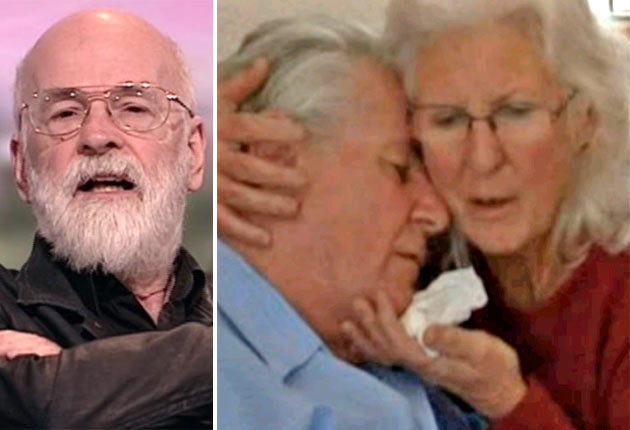Author defends film of assisted dying as BBC fields complaints
Sir Terry Pratchett said he made the programme because he was ashamed that Britons had to go to Switzerland to end their lives

The author Sir Terry Pratchett was forced to defend his documentary on assisted dying yesterday, after critics rounded on the BBC for broadcasting the death of a millionaire hotelier with motor neurone disease who chose to end his life in a Swiss clinic.
Anti-euthanasia campaigners accused Sir Terry and the BBC of "cheerleading" for a change in legislation, to which they are vehemently opposed. While religious groups tend to oppose assisted suicide on theological grounds, many disability activists are against changing the law because they fear legalisation of euthanasia would put pressure on the elderly and disabled to end their lives prematurely and detract from wider demands for better living provisions.
Clair Lewis, from the Disability Action Network, said: "At the very least there should be some balance in the debate. I support [Terry Pratchett's] right to kill himself. I just want him to leave the legislation protecting the rest of us from euthanasia, mercy killings, depressive suicides and assisted deaths alone."
Care Not Killing directed its anger at the BBC, arguing that the broadcaster should have done more to represent those who are opposed to assisted dying.
"This latest move by the BBC is a disgraceful use of licence-payers' money and further evidence of a blatant campaigning stance," said the group's campaign director, Dr Peter Saunders. "The Corporation has now produced five documentaries or docudramas since 2008 portraying assisted suicide in a positive light."
Sir Terry, who has campaigned vigorously for a change to the law since being diagnosed with Alzheimer's, appeared on BBC Breakfast to explain why he felt compelled to make the show, which on Monday night broadcast the final moments of Peter Smedley as he drank a lethal dose of barbiturates at the Dignitas clinic in Switzerland.
When asked why he made the film, Sir Terry replied: "Because I was appalled at the current situation. I know that assisted dying is practised in at least three places in Europe and also in the United States. The Government here has always turned its back on it and I was ashamed that British people had to drag themselves to Switzerland, at considerable cost, in order to get the services that they were hoping for."
He added that Mr Smedley, who took his own life shortly before Christmas, had given him permission to film his final moments.
"Peter wanted to show the world what was happening and why he was doing it," he said. "You can tell in the film that I'm moved. The incongruity of the situation overtakes you. A man has died, that's a bad thing. But he wanted to die, that's a good thing."
Mr Smedley, a hotel owner, flew to Zurich to end his life in a flat owned by Dignitas because assisted suicide remains illegal in the UK. In his final moments, as his breathing became short, he was filmed whispering to his wife: "Be strong, my darling."
Several anti-euthanasia groups have called on their supporters to complain to the BBC and the regulator Ofcom, but so far the documentary appears to have attracted limited anger from the public compared to similar programmes.
The BBC said last night it had received 162 complaints about the broadcast so far, as well as 82 positive comments. The Corporation also received about 750 complaints before the broadcast.
Ofcom said it would not be releasing official figures until next week, but a source at the regulator said the number of complaints "could currently be counted on one hand".
Join our commenting forum
Join thought-provoking conversations, follow other Independent readers and see their replies
Comments